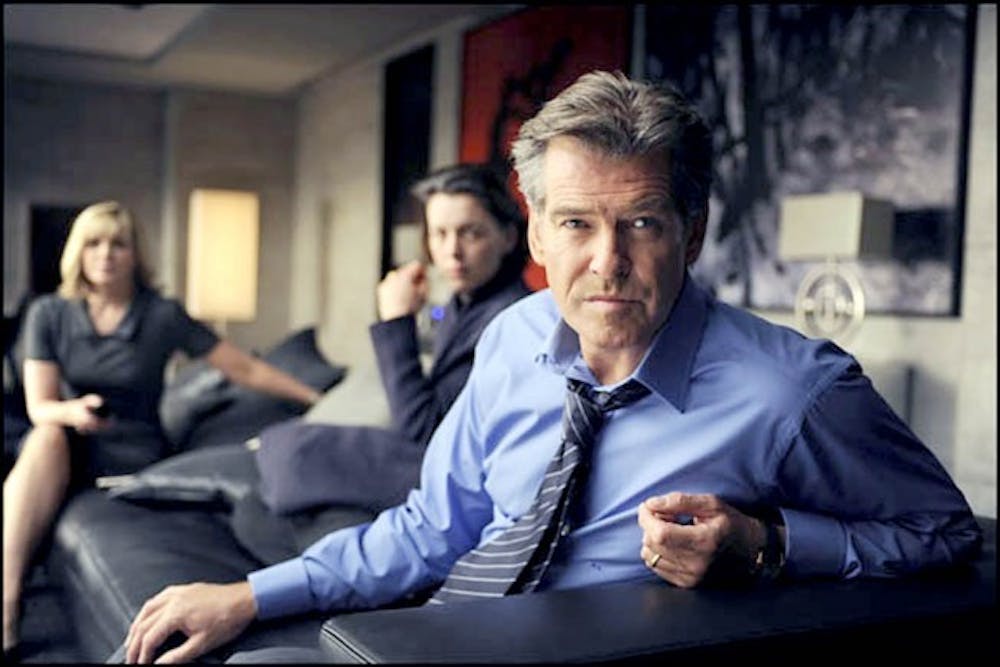Grade: B
Roman Polanski's new movie, The Ghost Writer, is the esteemed director's first foray into global politics. The result is a well-balanced mix between a Hitchcock thriller and 1970s conspiracy theory movies, like All the President's Men and The Conversation.
The movie, based on Robert Harris's novel The Ghost, dives into contemporary politics. The film particularly focuses on the sanctioned use of torture with a weird ease that Polanski has made famous. The director has a knack for making the seemingly normal into tense, cryptic milieus that take a painfully long time to sort out.
Like religion in Rosemary's Baby, water in Chinatown and the Holocaust in The Pianist, global political issues are taken to extremes. It has a strong message for a thriller, and Polanski uses it to both preach and parody contemporary issues.
In the movie, an unnamed ghostwriter (Ewan McGregor, Amelia) is hired by former British Prime Minister Adam Lang (Pierce Brosnan, Percy Jackson & the Olympians: The Lightning Thief) to revise his highly anticipated memoirs. Lang is embroiled in a scandal involving the kidnapping and torture of four terror suspects and is subsequently accused of war crimes by his former foreign minister, Robert Rycart (Robert Pugh, Suicide Man)
The writer, who has no political ties and is only doing the project for the money, is the replacement of another ghostwriter who drowned near Lang's Massachusetts estate. As the scandal materializes into something more serious, the writer becomes suspicious of his predecessor's death and does some investigations of his own – leading, of course, to sinister findings about Lang's beginnings and possible connections with the CIA.
Though the names are different, Lang is obviously based, painfully so, on Tony Blair. Lang's wife Ruth (Olivia Williams, Sex, & Drugs & Rock & Roll) is either based on Blair's wife Cherie or Hillary Clinton – perhaps both. The movie doesn't exactly attempt to cover up the representations, but they are so severe that it might as well have been historical fiction.
Of course, the plot is mostly poppycock. Its main contention that the International Criminal Court could try a British prime minister is bogus.
There is one thing about international law that makes it so tough to enforce: without solid evidence that a specific group of people perpetrated war crimes on an astronomical scale, there is little chance of justice, a major theme tackled in the film.
That's not to say, however, that George W. Bush, Tony Blair or Adam Lang is a war criminal. The term is used a lot in the movie but convinces no one. Polanski gets into the politics of torture, but establishes a standard: waterboarding is unequivocal torture and anyone who ordered a terrorist to be transported and viciously interrogated should go to jail for life.
Global politics are a complex organism that Polanski is only somewhat successful in expounding. He makes a liberal case when he should make an objective one.
Despite this, The Ghost Writer is very good. What makes the thriller work is its pseudo-Hitchcockian flair. With its nervous tension, attention to detail, throbbing music and broad sense of humor, Polanski obviously had the master of suspense in mind when making the movie.
The performances were solid as well. McGregor plays the writer without much of a personality, which is actually a good thing due to the nature of the story. Brosnan played Lang with a suave and sinister confidence without overdoing it.
Other bit parts, such as Lang's personal secretary, Amelia Bly (Kim Cattrall, Sex and the City), and the crusty Rycart, stood out for the relatively small time they had on screen. There's also a cameo by a very famous British actor to watch out for.
The Ghost Writer gets down and dirty, and dives into global geopolitics with thrilling but not exactly convincing results. Polanski is a master of cinema. It's too bad that this time around he is not a master of understanding how the world works.
E-mail: arts@ubspectrum.com





